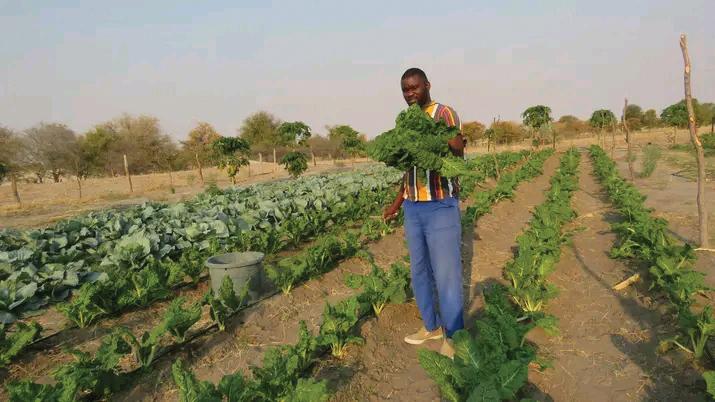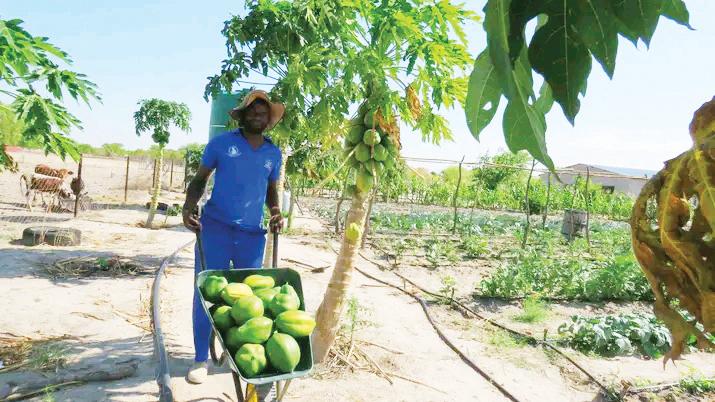Nine years ago, while working as a journalist for a national daily, Ileni Nandjato started farming as a hobby and to get away from the stresses of journalism. He was farming vegetables at the time. Soon, he realised he was earning a good income from the sales of his veggies. Ultimately, he quit his job to pursue farming full time. Today, he is a successful farmer of vegetables, fruits, poultry and livestock such as cattle and goats.
I paid this hardworking farmer a visit recently to get a glimpse of the farming activities at his farm at Ekolyanaambo village, just a few kilometres northwest of Ondangwa in Oshana Region (between Ondangwa and Ongwediva as the crow flies).
We are welcomed by friendly puppies barking as we arrive that Saturday morning. When I see Nandjato, he is busy tending to some spinach.
I ask him how he ventured into farming. “I grew up in a village where we used to do subsistence farming. When I went to school, agriculture was one of my favourite subjects, and I passed it well in Grade 10, but due to poor career planning, I could not pursue it up to Grade 12 level. However, in 2016, while working as a journalist, I revived my old passion for agriculture,” he says.
Nandjato farms with vegetables such as tomatoes, cabbage, spinach and onions, among others. He also has about 200 pawpaw and 50 mango trees. He has a poultry house with chickens, ducks and pigeons at his farm at Ekolyanaambo. His livestock, consisting of 47 cattle and 42 goats, stay at his cattle post at Okatyali in the Ombuga grazing area.
The road to becoming a farmer was full of twists and turns, though. “The journey has not been easy. There were many challenges. Starting capital was the biggest of them, and then access to land and water. However, right now I can confidently tell you that everything is going alright and we are reaping the fruits,” he notes.
Still, what triggers a man to quit a well-paid journalism job and move on to a “dirty” job? “Being your own boss, managing your time and getting no pressure from anyone apart from your own customers are the factors that motivated me to go into full-time farming,” Nandjato says whilst adjusting his hat amid the sound of a barking puppy and children’s laughter.
Local fruit and vegetable vendors are his main customers. He also has agreements with local retailers to whom he sells some of his produce. “However, if you have to sell your products to local shops, you have to be registered with the Namibian Agronomic Board (NAB), who have to make several inspections on your farm to ensure that you meet the standards,” he says. He also has a spot next to the Ondangwa-Ongwediva road where he sells his produce to motorists. He adds that he sells some of his livestock to generate money to buy equipment and pesticides, as well as medicine for his poultry when the need arises.
The married father of four feels that farming is more rewarding than a journalism job. “Being a journalist, you are working for somebody and always under pressure. Here, you are working for yourself and planning your own stuff. You just need to work hard.”
Nandjato is not only enjoying what he likes most and reaping the rewards, but he is also a proud employer of five other individuals. “There are a lot of activities going on here and I cannot manage on my own. I have five guys helping me out,” he notes, adding that during peak times he gets more extra hands to assist with the work.
There is no business venture without headwinds. “Finance is the most formidable challenge faced by those in the agribusiness. For instance, you may want to expand your farm or buy equipment or pesticides, but then sometimes you do not have the money. Banking institutions have strict requirements for their loans and some of us small guys cannot meet them,” he observes further, noting that there is a need to establish a financial institution with relaxed requirements to assist upcoming business people, especially those in the agribusiness.
The erstwhile scribe calls on fellow Namibians to venture into agriculture to do business, feed their families and create employment. “It can be tough at the beginning, especially if you are used to a fixed salary, but if you put in the effort, you can reap the fruits in no time.”
Ileni Nandjato is testimony that, regardless of the circumstances, with passion, hard work, commitment, dedication and a little bit of luck, nothing is impossible.






